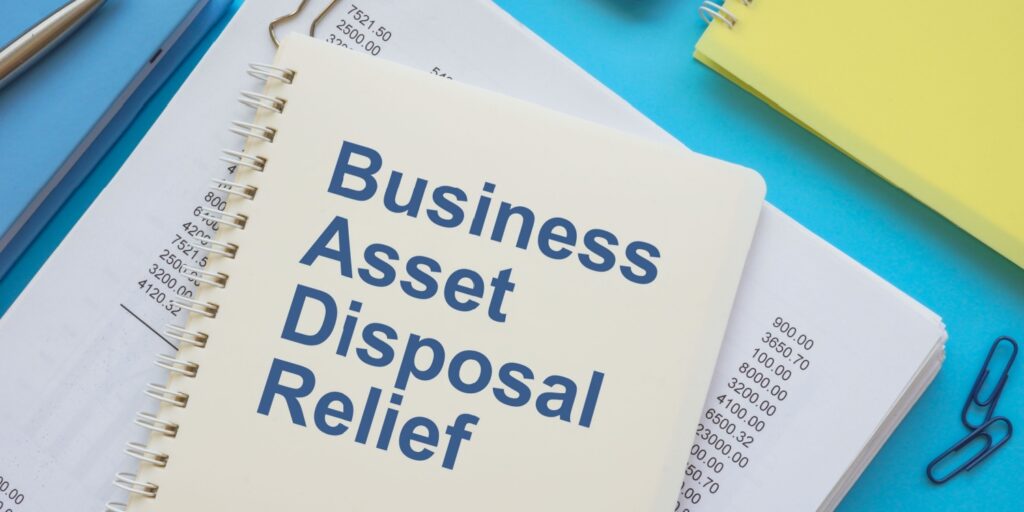Business Asset Disposal Relief (BADR) provides a reduced rate of Capital Gains Tax when you sell or ‘dispose of’ all or part of your business, including shares in a company. You don’t need to live in the UK to claim BADR. It is available to UK residents and non-UK residents whose business disposals satisfy the relevant eligibility conditions.
In this post, we discuss the basics of Business Asset Disposal Relief, including who can claim, the types of assets eligible for relief, and how to work out your gains and make a claim as an individual.
What is Business Asset Disposal Relief?
Previously known as Entrepreneurs’ Relief, Business Asset Disposal Relief is a type of beneficial tax relief available to individuals when they dispose of certain business assets under qualifying conditions.
Disposing of a business asset includes:
- selling it
- giving it away as a gift
- transferring it to someone else
- exchanging it for something else
- receiving compensation for it (e.g. an insurance payout)
If you’re eligible to claim BADR, you will pay Capital Gains Tax (CGT) at a reduced rate of 10% (rather than the standard rate of 20%) on any gains (profit) you make on the disposal of qualifying assets from your business.
BADR is restricted to a lifetime limit of £1 million of capital gains. This is the total amount of relief you can claim during the course of your life. Any gains above this amount will be subject to the standard CGT rate of 20% (or 18% or 24% on gains from residential property).
Business Asset Disposal Relief is available to both UK-resident and non-resident individuals who are:
- sole traders
- members of a business partnership
- shareholders in a ‘personal company’
- employees or office holders who own shares in a company (or group of companies) they work for
- trustees of settlements
The relief is not available to corporate bodies such as companies. Nor does it apply to individual shareholders or investors who are not employees or owners of the company in question.
Types of assets eligible for relief
Subject to certain eligibility criteria, you can claim BADR on a disposal of assets (or interests in those assets) that fall into the following categories:
- assets used in the business that you are disposing of in part or as a whole, whether you carried on the business on your own or in partnership. This includes goodwill (in some circumstances) and business premises
- assets that were in use for your own business, or in a partnership of which you were a member, and were disposed of within three years after the time the business ceased. This category excludes shares, securities, and any other business assets held as investments
- one or more assets consisting of shares in, or securities of, your ‘personal company’
- assets that you owned personally, but used in a business that was carried on by either a partnership of which you are a member or by your personal trading company
A ‘business’ includes any trade, profession, or vocation. However, it does not include the letting of property, with the exception of furnished holiday lettings in the UK or European Economic Area (EEA).
Eligibility requirements for BADR
To claim Business Asset Disposal Relief, you need to meet particular qualifying conditions. These conditions vary depending on the type of disposal you are making, which we outline below:
When disposing of all or part of your business
To qualify for BADR in this situation, both of the following conditions must apply for at least two years up to the date you dispose of the whole or part of your business:
- you are a sole trader or business partner
- you have owned the business for at least two years
These conditions also apply if you are closing your business rather than selling it. To qualify for the relief, you must dispose of your business assets within three years of the date the business ceased.
If you dispose of the whole or part of your business to a close company in which you and any ‘relevant connected person’ hold at least 5% of the ordinary shares, any gain on goodwill included in the disposal will not be eligible for BADR. A ‘relevant connected person’ is a company or trustee you are connected with.
However, this rule on goodwill won’t apply if you dispose of your shares in the close company within 28 days of disposing of your business to a company in which you (and any relevant connected person) own less than 5% of the ordinary shares.
When disposing of shares or securities
If you are a non-UK resident for tax purposes, you are not liable to Capital Gains Tax on profit made on the disposal of shares in a UK company, unless you return to the UK within five years of leaving.
Where any such disposals are subject to CGT, you will qualify for BADR if both of the following conditions apply for at least two years up to the date you dispose of your shares:
- you are either an employee or office holder (e.g. director or company secretary) of the company or one of the companies in the same trading group
- the company is either a trading company (rather than an investment firm, for example) or the holding company of a trading group
Under section 165A of the Taxation of Chargeable Gains Act 1992, a ‘trading company’ is defined as a company that carries on trading activities and doesn’t engage in other activities to a substantial extent.
However, if the company stops being a trading company, or a member of a trading group, you may still qualify for BADR if you sell your shares within three years.
Other rules also apply, depending on whether the shares are from an Enterprise Management Incentive (EMI).
Disposal of shares from an EMI
When disposing of shares acquired under an Enterprise Management Incentive scheme, you must have:
- purchased the shares after 5 April 2013, and
- been given the option to purchase the shares at least two years before disposing of them
Disposal of shares not from an EMI
If your shares are not from an EMI, the business must be your ‘personal company’ for at least two years before disposing of the shares. This means that you must hold at least 5% of the ordinary shares and at least 5% of the voting rights in the company.
In addition to these conditions, you must be entitled to at least 5% of the:
- profits that are available for distribution, and 5% of the company’s distributable assets on winding up, or
- disposal proceeds if the company is sold
If your percentage of shareholdings falls below 5% because the company issued additional shares, you may still be eligible for Business Asset Disposal Relief. In this situation, you can ‘elect’ to be treated as if you sold and re-purchased your shares immediately before the new issuance of shares. Doing so will create a gain on which you can claim BADR.
You can also make a further election to defer paying tax on the gain until you actually dispose of the shares. To do this, you need to complete the additional information section of the Capital Gains Tax summary pages in your Self Assessment tax return. Alternatively, if you don’t have to file a tax return for the year, you can write to HMRC’s Capital Gains Tax department instead.
When disposing of assets you lent to your business
This is known as an ‘associated disposal’. To qualify for Business Asset Disposal Relief in this situation, both of the following conditions must apply:
- you have sold at least 5% of your part of a business partnership, or your shares in a personal company
- you owned the assets but allowed your business partnership or personal company to use those assets for at least one year up to the date you sold your business or shares (or the date the business ceased)
This means that the disposal won’t qualify for relief if it’s not associated with a qualifying disposal of either your interest in the partnership or your shares or securities in the company. Restrictions on the relief may also apply if the asset was not used exclusively for business purposes, or if the company reimbursed you for the use of the asset.
How to claim Business Asset Disposal Relief
You can claim Business Asset Disposal Relief by completing the Capital Gains Tax summary pages (form SA108) in your Self Assessment tax return.
You’ll need to include computations (calculations) of the capital gain on which you’re claiming relief, including any estimates or valuations of the assets (where applicable), and the amount of tax relief due.
Alternatively, you can make a claim by completing Section A of the Business Asset Disposal Relief helpsheet. You will need to provide the following details on the form:
- Your name and address
- Unique taxpayer reference (UTR)
- Total of all previous chargeable gains (net of allowable losses) on which you have claimed BADR
- Description of the asset or assets
- Name and addresses of all income beneficiaries interested in assets disposed of
- Date of the disposal
- Each qualifying beneficiary’s income entitlement in percentage terms of the asset or assets disposed of
You must attach your computations of the capital gain on which you’re claiming relief, as well as the amount of tax relief due.
There is no limit to the number of times you can claim BADR. However, you are limited to £1 million in relief over your lifetime. You may be entitled to claim more if you disposed of your assets before 11 March 2020 – contact HMRC’s Capital Gains Tax department to find out.
Deadline for claiming BADR
The deadline for claiming Business Asset Disposal Relief depends on the tax year in which you sold or closed your business:
- Disposals made in the 2024-2025 tax year – claim by 31 January 2027
- Disposals made in the 2023-2024 tax year – claim by 31 January 2026
- Disposals made in the 2022-2023 tax year – claim by 31 January 2025
For example, if you sell a qualifying asset on any date between 6 April 2024 and 5 April 2025, you must make a claim for BADR no later than 31 January 2027.
Working out your gains and tax
You need to work out your capital gains and tax liability before making a claim for Business Asset Disposal Relief. The way you do this will depend on whether all of your gains are eligible for relief.
HMRC’s Capital Gains Tax summary notes include a working sheet that you can use for simple calculations of capital gains (or losses) on the disposal of land, other assets, and whole holdings of shares.
If all of your gains qualify for Business Asset Disposal Relief, you must:
- Work out the gain for all qualifying assets
- Add all of the gains together (and deduct any qualifying CGT losses) to work out the total taxable gain eligible for BADR
- Deduct your capital gains tax-free allowance (the ‘Annual Exempt Amount’), which is currently £3,000 for the 2024-25 tax year
You will pay 10% Capital Gains Tax on the remaining amount.
However, if you have other gains that do not qualify for Business Asset Disposal Relief, the amount of CGT you’ll pay on those other gains will depend on your Income Tax band.
Higher-rate and additional-rate taxpayers
If you pay Income Tax at the higher rate and/or additional rate, any gains you make on the disposal of chargeable assets will be liable to the higher rates of Capital Gains Tax.
This means that for gains that do not qualify for Business Asset Disposal Relief, you will pay the following rates of GCT for any disposals you make on or after 6 April 2024:
- 24% on gains made from residential property
- 20% on gains from other chargeable assets
You can use the tax-free allowance against the gains that would be subject to the highest CGT rates – for example, gains taxable at 24%.
For any disposals made on or before 5 April 2024, the rates are different. You’ll pay 28% on gains from residential property and 20% on gains made from other chargeable assets.
Basic-rate taxpayers
If you pay Income Tax only at the basic rate, you need to work out the CGT rate payable on gains that are not eligible for BADR. To do so, you must:
- Work out your total taxable income from all sources for the year. Remember to deduct your tax-free Personal Allowance (£12,570 for the 2024-25 tax year) and any other Income Tax reliefs you can claim.
- Deduct this amount from the basic-rate income threshold for the year in which you made the gains (£37,700 for the 2024-2025 tax year). The figure you’re left with is the amount of income still taxable within the basic-rate band, which you can use against your gains.
- Work out your total taxable gain.
- Use the amount still taxable at the basic rate against any gains eligible for BADR. You will pay 10% CGT on these gains.
- Use any remaining amount taxable at the basic rate against your other gains. You will pay 18% on gains from residential property, and 10% on gains from all other chargeable assets.
If you have any gains above the basic-rate income threshold, you will pay 24% on gains from residential property (or 28% if the disposal was made on or before 5 April 2024), and 20% on any gains from all other chargeable assets. Again, you can use your capital gains tax-free allowance against the gains subject to the highest CGT rates.
Thanks for reading
Business Asset Disposal Relief can provide significant savings on Capital Gains Tax if you decide to sell some or all of your business, including shares and business premises. It’s also available to non-UK residents, provided any disposals meet the relevant qualifying conditions.
Claiming this relief is relatively straightforward. However, disposing of assets and understanding HMRC’s rules can be complex, particularly when living outside the UK.
For general queries, you can contact HMRC, but we would recommend seeking professional advice and guidance from an accountant or tax professional in advance of any disposals.
We also recommend reading HMRC’s official guidance on Business Asset Disposal Relief.


















Join The Discussion
Comments (2)
Excellent article! This business asset disposal relief will be useful for many UK accountants.
Thank you for your high praise, David.
Kind regards,
The 1st Formations Team